We Are Many and the Reopen Chuds Are Few
Most people don't actually want to die for capitalism.
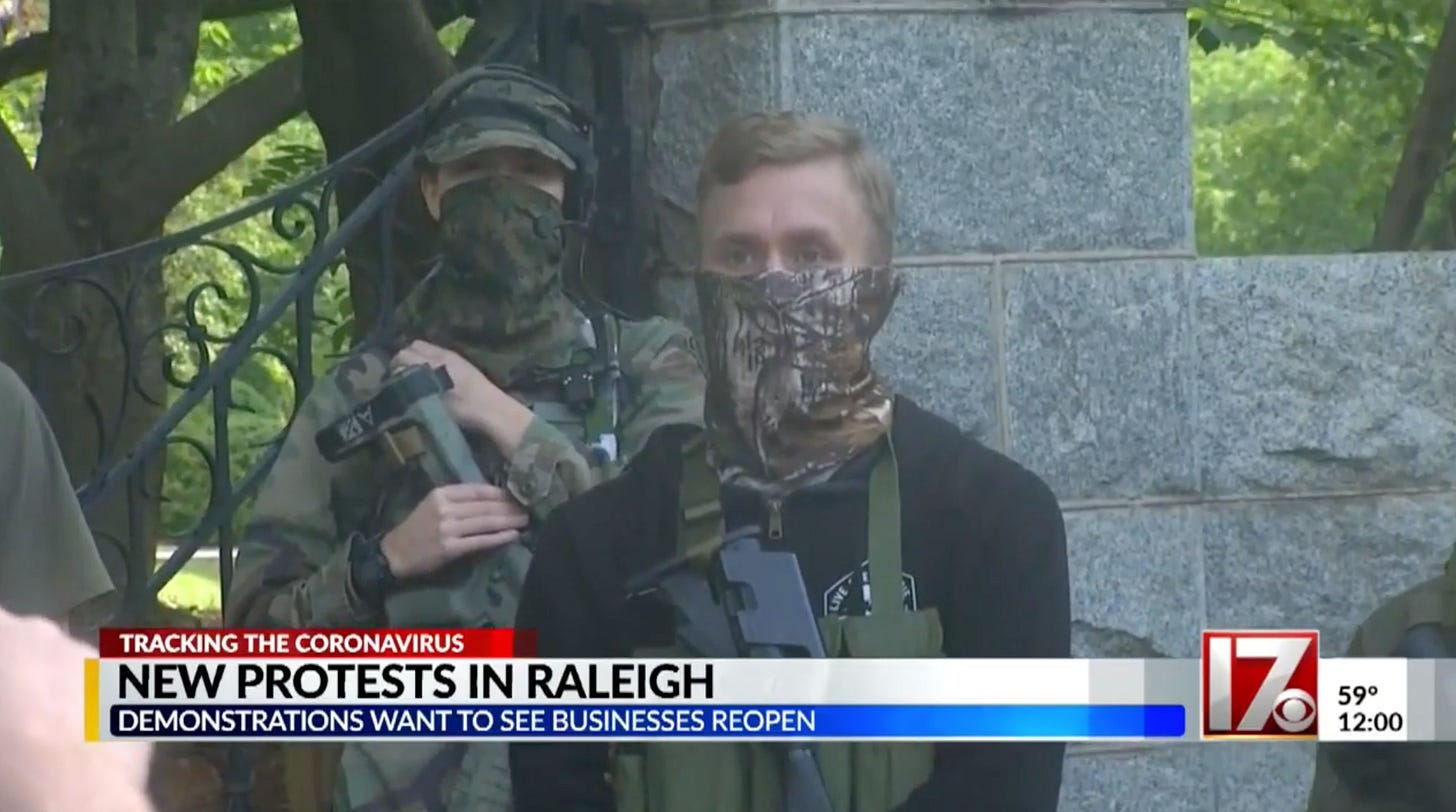
Over the weekend, a set of photos of people carrying guns in a Subway in North Carolina went viral. The photos, taken by Raleigh News & Observer journalist Travis Long, show demonstrators carrying everything from a wooden gun to some kind of grenade launcher type thing.

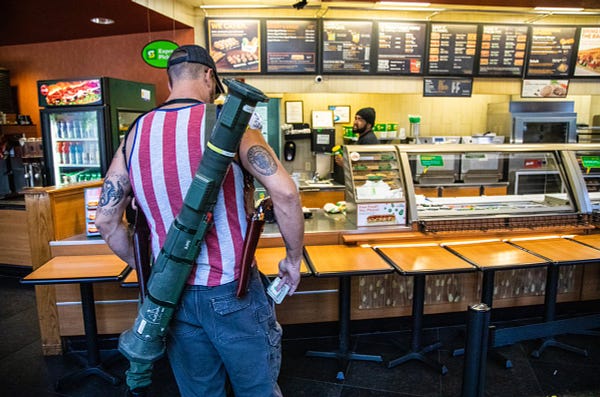
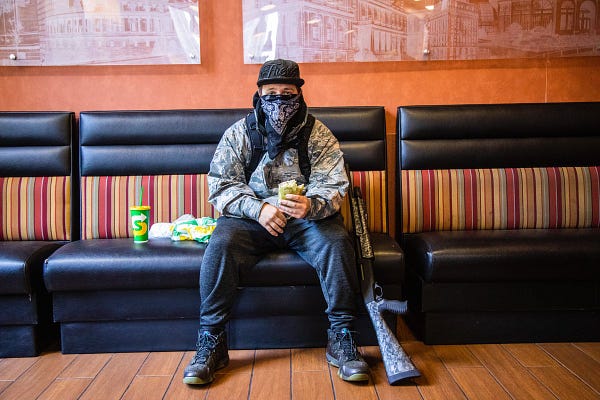
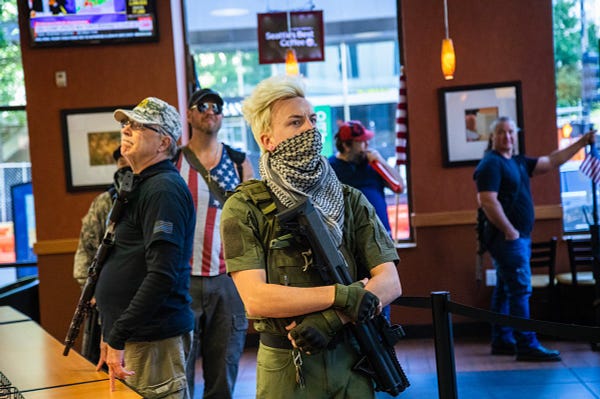
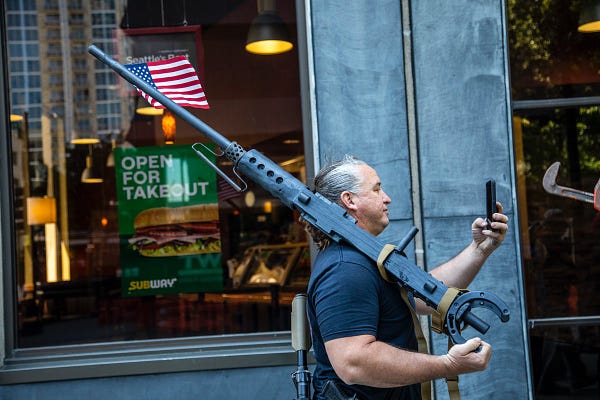
The demonstration consisted of about 11 people, as Long pointed out, relegated to sheepishly ordering sandwiches at Subway in between sessions of Lost Cause cosplay.
I live in Raleigh, just a few miles from this Subway. It’s steps away from my favorite music venue in the city, on a street that’s normally bustling with people on the weekend. Past 10 p.m., the options for food are somewhat limited, so I’ve drunkenly walked into this Subway on my fair share of occasions at 11 p.m. and ordered a footlong. I’ve also seen it serve as a brief refuge for the city’s homeless population — somewhere to get out of the cold or the rain or just rest for a bit on an actual seat — after the city shut down a nearby square for renovations.
The employees there have seen everything and been expected to be everything: fast food workers, peacekeepers, social workers. Now, this: Fewer than a dozen people armed like they’re about to storm an ISIS compound as soon as they finish their Italian BMT’s.
North Carolina, like Michigan and some other states around the country, has seen its fair share of protests demanding that they be allowed to proceed as if there isn’t a global pandemic happening right now. The ReopenNC Facebook group has 76,000-plus people, although I and at least 11 friends who are definitely not #Reopen people are members, so there’s not exactly a high barrier to entry.
The local and national press has covered these protests breathlessly, though attention from the latter has slowed up as numbers have dwindled and Michigan has become the center of the action. Since the beginning of the protests five weeks ago, there’s been a vocal split in the group, proving that the right can be just as dysfunctional as every other political coalition.
For all of the attention these people are getting, however, they are an extreme minority. The idea that governors are stampeding to end lockdowns because of a legitimate groundswell of popular opinion is a total myth. Polls everywhere in the U.S., including North Carolina, show that a majority of people are not willing to die so the capitalist machine can keep churning, at least not yet.
What’s more, the politicians who are taking things more slowly — though not slow enough, arguably — are being rewarded by their voters. Roy Cooper, the state’s governor who won by a razor-thin margin four years ago, and who has been relatively cautious about reopening, has an approval rating of 74 percent and a majority approval among Republicans. (On the other hand, Georgia Gov. Brian Kemp, who pushed through an early reopening of his state, has a 39 percent approval rating.) Cooper was supposed to have a tough re-election fight on his hands this year with lieutenant governor Dan Forest; a poll late last month found he has a 27-point lead.
The reason for this is simple: People can clearly see that there’s a problem. North Carolina has had 15,346 confirmed positive cases of coronavirus and 577 deaths. Every county except one has had at least one confirmed positive case. In Raleigh, where a lot of transplants from the Northeast and other parts of the country live, many of us have friends and family back home who are dealing with an even worse version of this.
To the extent that states are reopening, they aren’t doing it for the guys dressed to storm the beaches at Cape May, or the suburban brats who believe their right to eat Red Robin trumps someone else’s personal safety. They’re doing it for their donors — the corporate executives who would rather sacrifice a thousand workers on the altar of capital than take the economic hit required to keep workers safe — and for themselves, in some misguided belief that America is not a place in which people live but an economy, one which people are willing to die for. It turns out that very few people are willing to die for this shit when most of them will never benefit from it when they’re alive.
I’m extremely lucky in that I’m not an essential worker being forced into a deeply unsafe situation. My partner and I are able to work from home and have rarely left the apartment other than to go on a walk, go to the grocery store, or get the occasional takeout dinner. I’m extra lucky in that we live together and we have two cats, because I, like everyone else I know, have become extremely acutely aware of how much I need to encounter other living things on a regular basis in order to not go insane.
I turned 30 last month and got to see my friends for the first time in weeks as we drank beers and hung out in my apartment complex’s parking lot from much further than six feet away. It lasted about an hour and it made me happy for days. I haven’t seen my friends since then and more often than not I feel like I’m in the middle of a depressive episode.
All of this sucks, and the sinking feeling that things aren’t going to get materially better for many people in this country any time soon doesn’t make it any easier. But I am not an adult child who can’t fathom caring about anyone or anything beyond my immediate desires. And if there’s any consolation to be taken from this situation, it’s that for now at least, there’s many more of us than there are of them.





A big part of this is, as you said - the breathless coverage of these protests by the media. I get that it's a slow news cycle beyond COVID. But these stem from astroturfed campaigns by big money, right wing donors. Some have spread organically following in their lead however. But there have been just as many "protect renters" protests from the left going on and you don't hear a PEEP about them from the local or national media.
The US Congress's choice so far to barely give anyone any money (during the biggest financial crisis since the Great Depression) is a huge factor in keeping people from going out and spending. If the US federal government never gives us anything more than $1200, why spend that on a dining experience?
If Republican governors/state legislators actually want to save businesses in their states through the power of consumerism, they should tell their allies in the US Senate to give US consumers more financial security. Until then, "reopening" the economy won't do much to increase consumer spending.